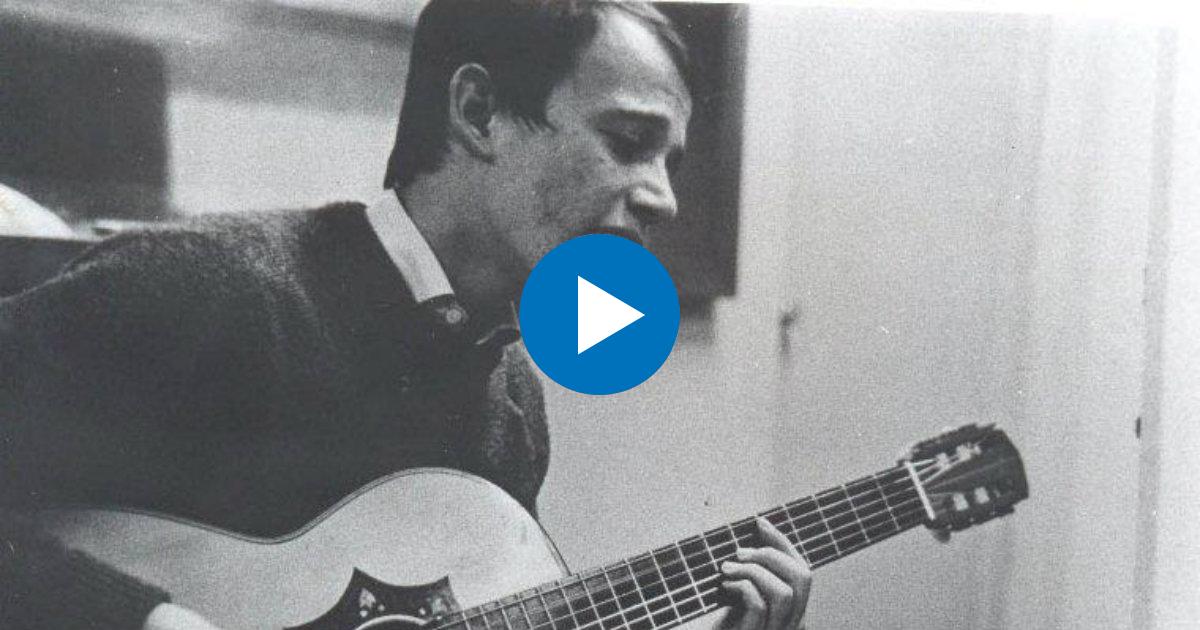
A song magically combines lyrics and music. With the great songs, the fascination skyrockets to the point of a mystery that the singer-songwriter passes on to the public in space and time.
Those are some of the qualities ofHopefully, by Silvio Rodríguez: magic, mystery, fascination, time, space. His charm has managed to elevate his text to the mythical terrain of hypotheses, of speculations, of that not knowing completely, which is also typical of great songs.
The first myth ofHopefully It was the content of his lyrics, the doubt about whether it was amatory or in reality it was a tangled and dark political metaphor against 'who you know'.
Of course, in the Cuba of the 70s, 80s, 90s and decades to come, this was a provocative and inconvenient interpretation when it came to who it was: Silvio and Fidel. To the point that said song even became literary content in some schools in order to clarify thatHopefully It was solely and exclusively a love song and not what we were all thinking.
In any case, the doubt was never completely cleared up and from there, and from a certain legend of the 'dissident' beginnings of its author,Hopefully It was the shadow under which Silvio sheltered throughout all his radical pronouncements in favor of Fidel and the Revolution. This is what happens with mythical musicians, who drag their entire work with them to the ambiguity of legend. And of course, this is the case of ojala.
But the biggest mistake we have made withHopefully It has not been strictly interpretive, but rather a more physical, phonic one, although in the long run it also had interpretative consequences: many times where Silvio and his audience have sung in unison in live concerts “snow shot”, believing that it is one of its most unintelligible metaphors, it is actually, as can be heard in the original recording, “snow shot.”
The misinterpretation of 'nieve' as 'nievi' has been on the internet for some time now and has been the subject of discussion in forums and debates on the internet. Those who think that it is 'nieve' instead of 'nievi' refer to Silvio's own official websites or those linked to him, where the word 'snow' always appears in all the lyrics of the song.
This group of commentators say that the use of 'snow' would be one of the most poetic and timely in the song and in all of Silvio's lyrics, so there would be no room for it to be a 'mistake' in hearing. .
However, there is an incontestable fact: in the audio of the original recording ofHopefully which according to these same official websites appears on the album At the end of this trip, from 1978, you clearly hear 'nievi' and not 'nieve'.
What or who is 'nievi'?
The defenders of the 'nievi' option argue in these forums that Silvio refers to the Nievi rifle, famous and old rifles with which almost all the young Cubans who did their military service trained, like Silvio himself, and which were part of the outdated equipment from Russian military aid to the Island during the 60s.
But the rifle argument already enters the realm of myth, just as the origin of the name also falls into a mythical zone. According to some, 'Nievi' was the alias of Vassili Grigorievich Záitsev, a Soviet sniper who owes his greatest fame to the remote execution of 225 soldiers and officers of the Wehrmacht and other Axis forces during the Battle of Stalingrad, including eleven German snipers.
If Silvio's original intention was to refer to the rifle or the sniper 'Nievi', would the meaning of sudden death advocated by the text be more effective than if he had used a metaphor as anomalous and innocuous as that of the 'snow shot'?
As always happens when it comes to soldiers, battles, heroes, the truth about Nievi himself is blurred in the mythological fog of Soviet war propaganda when talking about the Second World War, which makes it more difficult to link his figure withHopefully.
In any case, and if what about 'Nievi' is true, why has Silvio, instead of correcting our mistake, reinforced it over time? So as not to contradict your audience?
Perhaps he has understood that the public's 'snow' is more accessible to understand than his original 'Nievi'. Or that the song now belongs more to his audience than to himself and that is why he continues the path that we have marked for him. Or because he himself has believed that our 'errata' in the long run results in a lyrical gain, albeit involuntary, of the lyrics. We will never know for sure and it is logical: it is part of the myth that isHopefully.
Be that as it may, let's not try to solve a mystery about which those who have the answers have preferred to remain silent. Better let's leave the misunderstanding as it is, let's not go into clarifying the doubt: let's let the myth act as it is, without touching it. In the end, the mythical is also the watering hole of a nation's creativity and cultural spirituality.
(Image taken from El Zurrón del Aprendiz)
What do you think?
COMMENTFiled in: